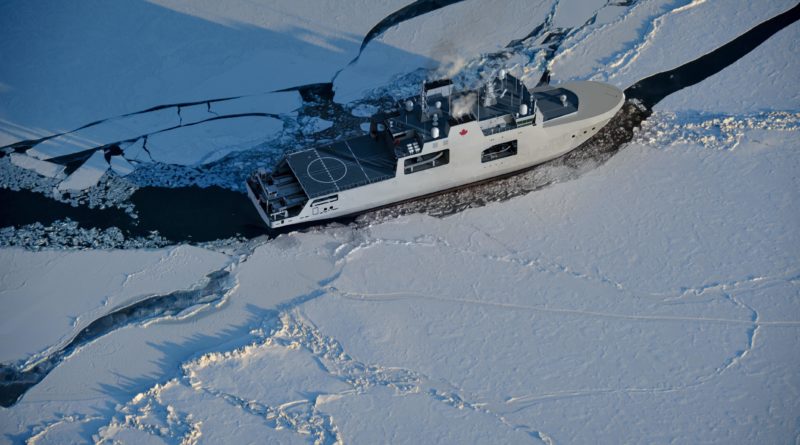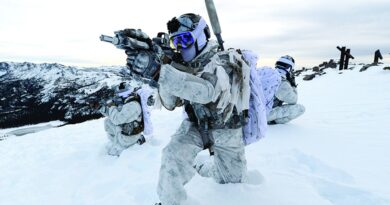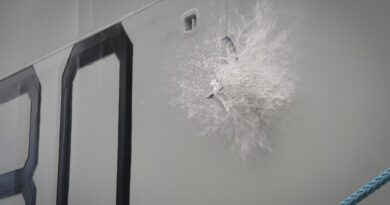Canadian Ocean Science and the Role of AOPS
By Dean McFadden
Jim Hanlon, Chief Executive Officer, Centre for Ocean Ventures & Entrepreneurship, was the RUSI(NS) Distinguished Speaker 20 May 2020, and spoke to the members of the Institute and guests with a presentation titled “Canadian Ocean Science and the Role of AOPS.” Slides from his presentation are posted at http://rusi-ns.ca/canadian-ocean-science-and-the-role-of-aops/.
Given its size, space and modularity, the Arctic and Offshore Patrol Ship (AOPS) has the potential to offer much greater support to scientific activity than anything else in the Royal Canadian Navy’s (RCN) inventory, and I am of the view that it should be so tasked. My concern is that the case be put well and in a way that considers and helps address what will be multiple demands on the use of the platform.
In an attempt to establish importance, the use of altruistic rhetoric and general commentary on the primordial importance of scientific research, particularly in the Arctic, can be unhelpful. Such statements as “the Arctic defining us as a culture” and of it being “the most important element in our foreign policy”, as well as us “having a fundamental responsibility to take on scientific missions” are appealing and have some validity. However, they may make it more difficult than is necessary to balance the requirements of other interests. It is this balancing of requirements that must be achieved because when on line these will be ships in high demand for numerous, national-level missions.
They will likely be very, very busy ships. They will need to consistently integrate in other RCN fleet operations. They will undertake dedicated Arctic tasks, as the season allows, of presence, surveillance, monitoring, as well as support to other government departments in the security role and in social/cultural development. Maintaining presence and overwatch of our Atlantic and Pacific approaches year-round must also occur, and as these also become busier places. All of these assignments can and must be coordinated in time and included in multi-year operational schedules, with trade-offs considered and activity coordinated with other agencies.
What can’t be similarly forecast, but which will occur and demand response are reactions to natural or man-made disasters. The AOPS is also very well suited to the humanitarian assistance and disaster relief (HADR) mission sets, especially if used in tandem, and there will be numerous demands upon them, both close to home and at the far end of the earth. Realizing the likely frequency of such things in future, the RCN has already postulated HADR as a core military mission.
So, scientific support is but one of the demands that will pressed on the class, but it shouldn’t be one that is considered as an afterthought, squeezed in where possible amongst other, dedicated activities. This is the time to advocate for appropriate consideration and inclusion in the development of the ships’ concept of operations.
My advice in doing so is to be pragmatic and acknowledge the expansion of capability that will occur as the class develops and all parties learn by doing. Framing the argument in terms of fulfilling a moral responsibility to Canada and Canadians won’t help the debate. I have no doubt that the RCN – both senior leadership and sailors on the deck plates – want to better contribute to scientific knowledge, for the good of Canada and the planet. They also want and need to do many other things and so the ships must always be multi-purpose. AOPS offers the opportunity for that to include many more partners.
The scientific community should be one of those partners, but the science voice will be more effective if there is some identified community of interest. Developing a sense of scientific priorities and some singular agency that could align and advocate for these would be very useful. That may be a role for the Centre for Ocean Ventures and Entrepreneurship, as the partner with whom others could interact. But, regardless of who could appropriately take this on, having an identified agency that could corral the ideas of the herd would be a great step at this stage. These comments are not intended in any way as criticism of the excellent presentation on Canadian Ocean Science and the Role of the AOPS, or of the very useful interaction that it engendered in the video-conference. More can and should be done to encourage the collaboration of maritime entities. My experience in such things, in particular with the development of the coastal Marine Security Operation Centres, is that practitioner discussions are what produce effective collaboration. Although guided by an understanding of policy parameters, it is the effective interplay of identified stakeholders that will formalize operational processes and maximize output. That interplay is undoubtedly already ongoing. A voice, not numerous voices, for scientific research should be a part of it.
Dean McFadden is a retired Commander of the Royal Canadian Navy.




